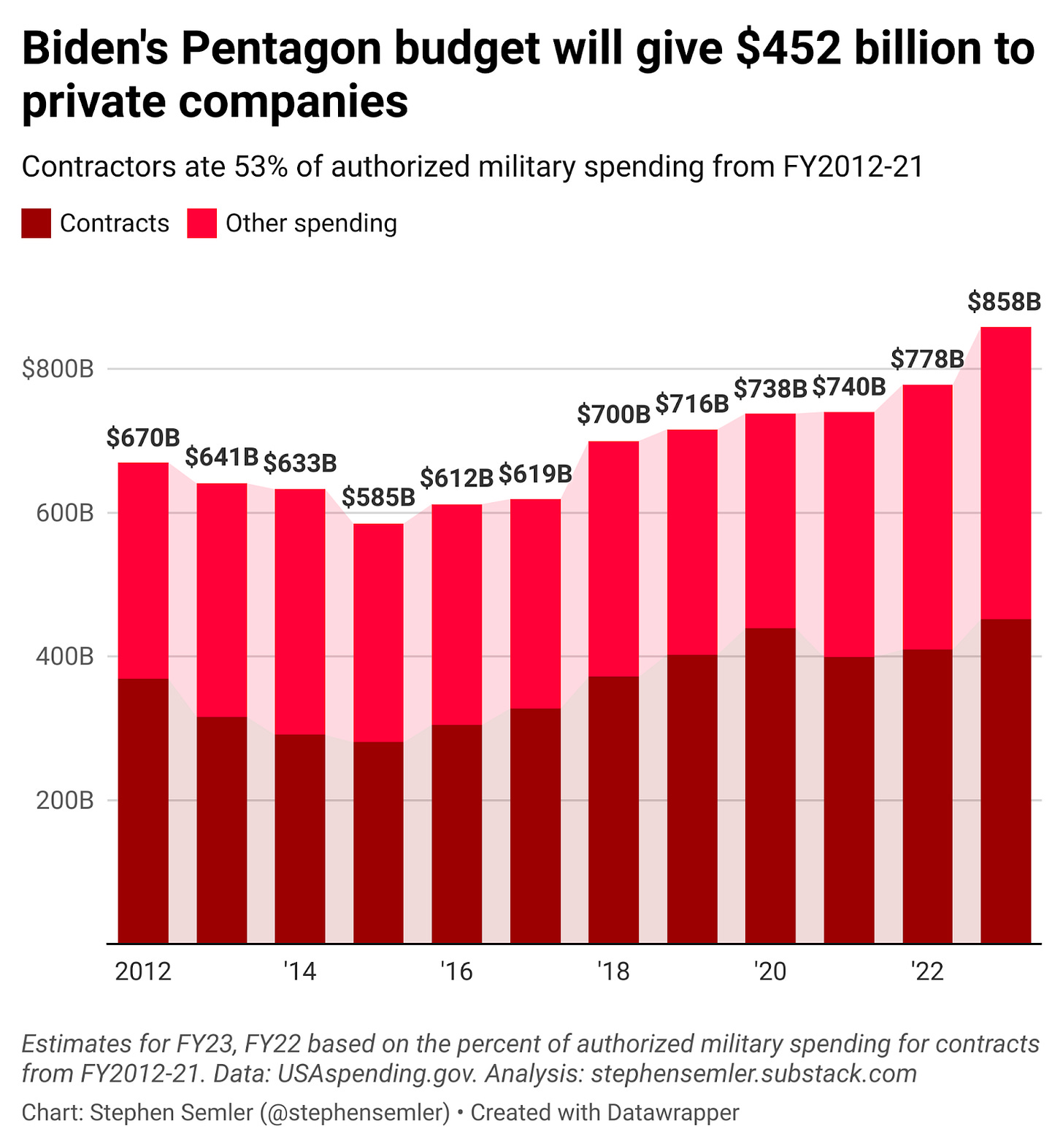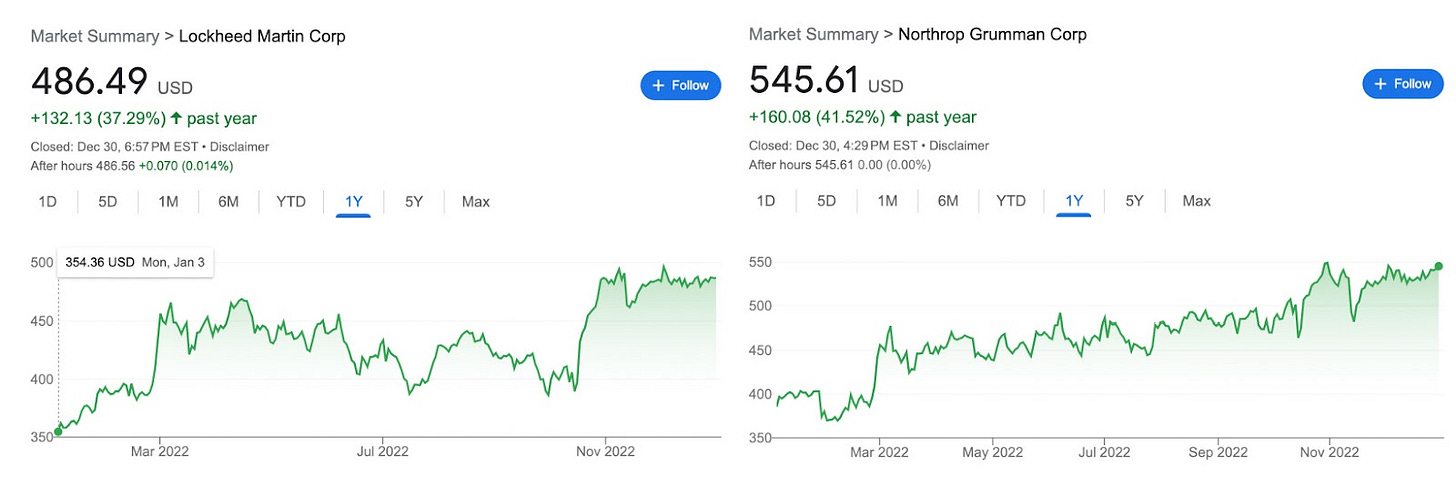$858,000,000,000
In 2015, the United States spent $585 billion on its military, more than the next 11 countries combined. Since then, the United States withdrew from Afghanistan, ending its longest-running war.
And yet, eight years later, President Biden approved $858 billion in military spending — an increase of about $273 billion. Had military spending kept pace with inflation since 2015, military spending would be below $700 billion. Instead, the military budget is barrelling toward $1 trillion annually.
The budget of the Pentagon now exceeds "the budgets for the next ten largest cabinet agencies combined." Current defense spending, after adjusting for inflation, "is higher than it was at any point during the Cold War." 2023 will represent "the largest U.S. military budget since World War II."
While conventional wisdom is that American politics is hopelessly divided, Republicans and Democrats routinely come together to approve massive increases in military spending. There is virtually no public criticism of military spending increases among members of Congress, where support for larger defense budgets is seen as an expression of patriotism. In the House, only one member, Congresswoman Alexandria Ocasio-Cortez (D-NY), voted against the omnibus bill that contained the military spending. (Many Republicans opposed the bill, but only because they believed it contained too much support for domestic programs.)
While Republicans and some Democrats insist that domestic spending is "paid for" with budget cuts or tax increases, military spending increases are routinely financed with deficit spending. And no one is wringing their hands about the inflationary impact of adding hundreds of billions to the military budget.
The absence of a real public debate does not mean there aren't real tradeoffs to this level of defense spending. One percent of the 2023 defense budget is $8.58 billion. That could finance over 1 million public housing units, enough to effectively end homelessness in the United States. (The federal government currently spends about $3.5 billion annually to combat homelessness.)
Would the United States be better off with an $850 billion military budget (instead of $858 billion) and much less homelessness? What about increasing compensation for teachers? Or extending the expanded child tax credit to keep kids out of poverty? These are all legitimate policy debates. But these debates are not happening.
It's not Ukraine
Is the 2023 military budget inflated to account for the costs of helping Ukraine fend off the Russian invasion? No. The $858 billion budget includes just $800 million in support for Ukraine.
That is not to say that the Biden administration or Congress believes Ukraine will only require $800 million in assistance in 2023. Rather, Congress is considering, and expected to approve, "an extra $21.7 billion for the Pentagon, above the already expanded 2023 annual budget, to allocate more money to resupply materials used in Ukraine."
A bonanza for military contractors
According to an analysis by Stephen Semler, approximately $452 billion of the $858 billion military budget will go to private contractors. Every year, more than half of military spending goes to contractors like Lockheed Martin, Northrop Grumman, and Raytheon.
Investors have taken note of unrestrained spending on weapons and other military equipment. The S&P 500 index declined 19.4% in 2022; but Lockheed Martin and Northrop Grumman each saw their stock price increase in 2022 by more than 35%.
In 2022, the defense industry employed 770 federal lobbyists. That means defense contractors employ nearly two federal lobbyists for every member of Congress. In the first three quarters of 2022, the defense industry "spent over $101 million on federal lobbying." In the 2022 cycle, defense industry PACs and executives donated $18.9 million to federal candidates. The money was spread relatively equally between Republicans ($10.3 million) and Democrats ($8.6 million).
The spending in 2022 by the defense industry was not an aberration. Between 2001 and 2021, the top five defense contractors — Boeing, General Dynamics, Lockheed Martin, Northrop Grumman, and Raytheon — spent "over $1.2 billion, on federal lobbying and campaign contributions, according to data compiled by the Center for Responsive Politics."
Secretary of Defense Lloyd Austin, an advocate for large military spending increases, was on the board of Raytheon prior to being nominated by Biden. The position paid him $300,000 per year.
A report by the Project on Government Oversight concluded that the "revolving door of Pentagon officials and senior military leaders seeking lucrative post-government jobs" ends up conflating "what is in the best financial interests of defense contractors—excessively large Pentagon budgets, endless wars, and overpriced weapon systems—with what is in the best interest of military effectiveness and protecting citizens."
Money for weapons the Pentagon does not want
Each year, top Pentagon brass submits a list of "unfunded priorities" — essentially "a wish list—everything that they want from here to the moon" — to the White House. Historically, the understanding was that not everything on this list would be funded. Resources are limited, and it is the role of civilian leadership to determine priorities. This year, the White House examined this list and proposed a budget of $802 billion.
In recent years, however, military leaders "have started sending the list of rejects to the congressional armed services committees, as a sort of appeal." For a time, these lists were generally ignored. But not any longer. This year Congressional "committees have rubber-stamped nearly every single item on the list."
After adding funding for weapons systems that the White House deemed unnecessary, Congress also added funding for weapons that the Pentagon itself does not want. This year's budget, for example, prohibits "the retirement of the F-22 Raptor fighter jet" and scuttles "retirement plans for various aircraft, including B-1, F-15, E-3 AWACS and C-40 aircraft." The Navy "sought to decommission 24 ships and build eight." But the approved budget authorizes "the procurement of 11 battle force ships and reversed plans for the early retirement of 12 vessels in the coming year."
What got cut
The Defense spending bill includes "a 4.6 percent across the board pay increase for military personnel and civilians." But there was a proposal for "an additional 2.4 percent for troops and Defense Department civilians making less than $45,000 a year" to account for inflation. (Inflation in 2022 was about 7%.) The increase would have benefited "783,000 service members and about 37,000 civilians." The benefit, however, was removed by House and Senate negotiators.
Military personnel, including hundreds of thousands that make less than $45,000 annually, do not have lobbyists.
The Pentagon cannot pass an audit
The budget for the military continues to increase even though the Pentagon cannot provide an accurate accounting of how the money is spent. In 1990, "Congress passed a law directing all federal agencies to produce regular, audited financial statements." The annual audit "allows Congress and the public to hold federal agencies accountable for how they spend tax dollars."
But the law does not include any consequences for non-compliance, and the Department of Defense did not even attempt to complete an audit until 2017. Since then it has failed the audit process five times. In this year's audit, only "seven of the 27 entities that make up the Department of Defense received a clean bill of financial health."
The Department of Defense spends about $1 billion per year, employing 1600 auditors, to conduct the financial review but has not been able to achieve meaningful improvements.





Every time somebody says we don't have enough money to fund public schools or mental health services or Medicaid expansion I tell them to look at the defense budget.
This is among the most crucial issues of our time. Please keep pulling on this thread Judd. Can't wait to see the list of politicians who've taken money from these private defense contractors, how much they've taken, and what leadership roles they occupy on House and Senate committees.
I hit the “like” icon because this piece provides excellent insights. But military spending disgusts me. We pay for ships the Pentagon doesn’t even want but fail to fund slightly higher raises for the lowest paid service men and women. People don’t matter in this country.